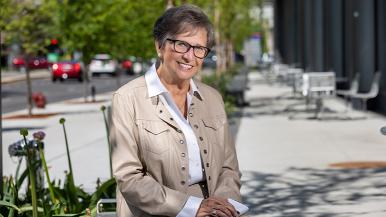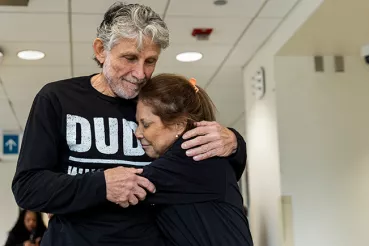Wanda Veld was feeling tired but otherwise fine when she went to RUSH for her annual mammogram in 2010. That's until doctors discovered an unusual spot in her left breast — but it wasn’t what you might think.
After a second mammogram, then a biopsy, the grandmother of six from Crete, Illinois, was diagnosed with stage four mantle cell, non-Hodgkin lymphoma — an incurable type of blood cancer.
“Being told you have cancer — and that it can’t be cured but controlled — was a sobering experience,” says Wanda, who has been a patient at RUSH for more than 60 years. “It was really a sock in the stomach.”
A rare diagnosis
Mantle cell lymphoma is an aggressive form of non-Hodgkin lymphoma, representing only 6% of all new non-Hodgkin lymphoma cases in the United States.
“There are a variety of lymphomas — some curable and some not,” says Parameswaran Venugopal, MD, a hematologist at RUSH, who was one of Wanda’s doctors. “While mantle cell lymphoma is one of the most treatable types of lymphomas, it’s not considered curable as it has a tendency to relapse.”
With the available treatment options at that time, Wanda’s doctors said she had between three to five years to live but that didn’t stop her from pursuing treatment.
“When I was diagnosed, I realized that some things are not very important anymore, and other things are very important — and I established that quick,” she says. “So, I decided I would have quality years and started treatment.”
Wanda’s new birthday
Wanda’s doctors recommended a stem cell transplant — in which stems cells damaged by cancer are replaced with healthy ones.
It was tough going, though, as Wanda’s white blood cells that protect against illness plummeted.
“There were nights that I'd go home and wonder if she was going be there tomorrow because she was so down,” says Wanda’s husband and caretaker, Jim Veld. “But she handled it like a trooper.”
And on March 16, 2011, Wanda celebrated her new birthday — a day that many patients who have a stem cell transplant recognize when the healthy cells enter and reset the body.
“I remember my nurses came in with this cupcake to celebrate my new birthday,” Wanda says. “They made a big thing of it, which was sweet.”
A setback
After her stem cell transplant, Wanda’s doctors found cancer cells in her bone marrow.
Wanda started chemotherapy and completed her final round in 2014. Since then, she has been in remission without any evidence of cancer.
As part of her follow-up care, Wanda was put on an antibody maintenance treatment that she received through an IV, every six weeks for nine years.
“A common effect of lymphoma treatment is lower levels of immunoglobulins — or proteins in the blood that protect us from infections,” Venugopal says. “The antibody maintenance that Wanda received, known as intravenous immunoglobulin, helped her from getting repeated infections post-treatment.”
Completing more than a decade of treatment
After 13 years of care, Wanda had her last maintenance treatment in April of this year.
“I have energy and quality of life, and I feel great,” Wanda says. “And I had my favorite nurse Laurie by my side at my last treatment, so that was good way to finish it up.”
Venugopal commends Wanda for her “resilience, positive attitude and optimism” during treatment.
“The way she handled her cancer not only encourages the caretakers, but also encourages other patients, too,” he says. “Even when she was not feeling well, she encouraged everyone — and that is not something everyone can do.”
'Every day is a gift, and I’m so grateful to God and RUSH'
There isn’t a standard screening tool for non-Hodgkin lymphoma, and without any major symptoms, it can be difficult to diagnose.
“If I wouldn’t have gone for my yearly mammogram, I never would have known that I had cancer,” she says. “So, I ask people all the time, ‘Did you get your mammogram? They're very important.’”
Venugopal also emphasizes how critical it is to keep up with your routine screenings and appointments with your primary care doctor.
“Whether it’s a colonoscopy, mammogram or Pap smear,” Venugopal says, “these are things you should not take lightly. Diseases are most treatable and curable when you catch them early.”
Wanda is thankful she decided to get her mammogram — and for her team at RUSH.
“I got to witness four of my family members’ weddings and all of my grandkids’ graduations that I never would have,” Wanda says. “Every day is a gift, and I’m so grateful to god and RUSH.”




